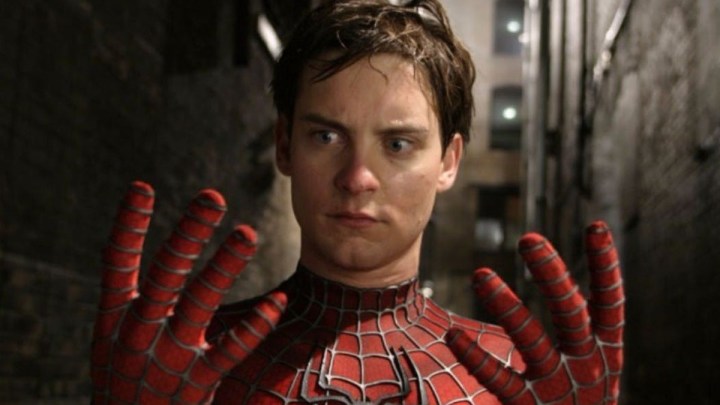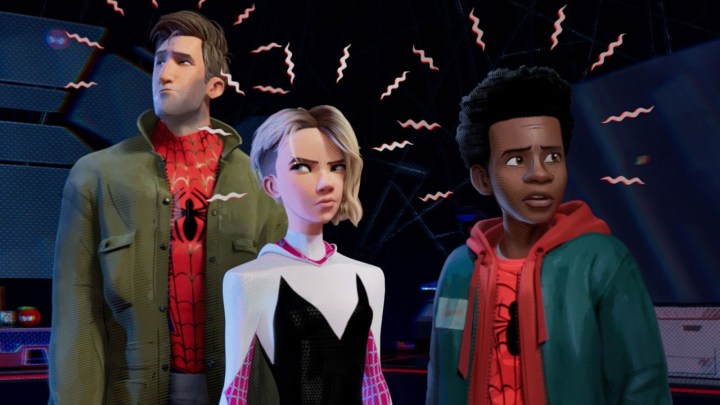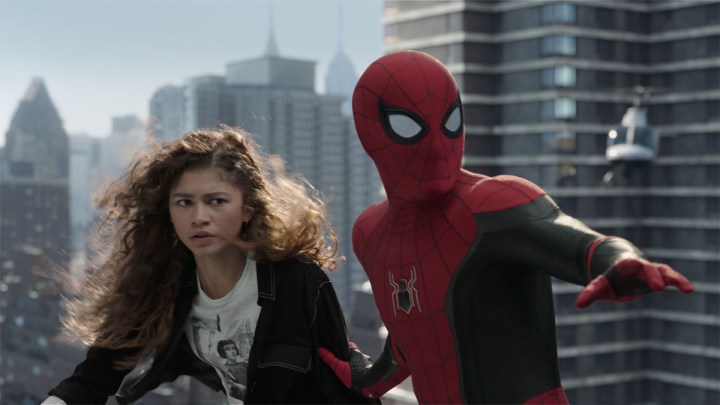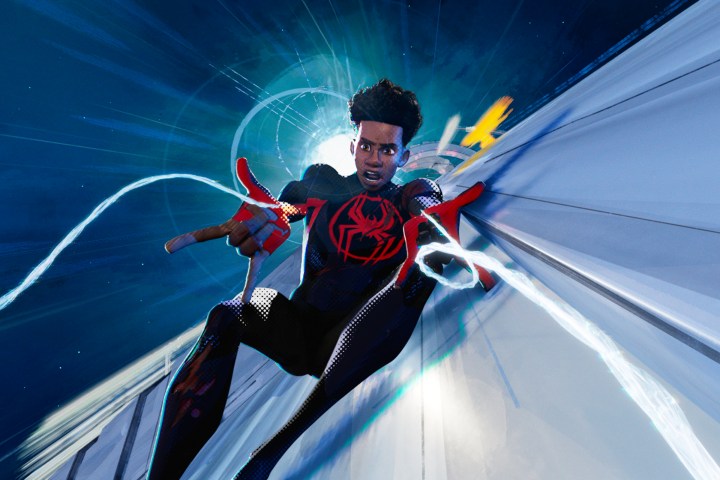
As one of the greatest superheroes in comic book history, Spider-Man has gotten the movie treatment many times in the past half-century. A total of 14 movies centered around the web-slinging hero have been made so far. While it may have taken a while for Spidey to get a film deserving of his character, the hero has now become amongst the cinema industry’s most profitable IPs.
- Spider-Man (1977)
- Spider-Man (1978)
- Spider-Man Strikes Back (1978)
- Spider-Man: The Dragon’s Challenge (1981)
- Spider-Man (2002)
- Spider-Man 2 (2004)
- Spider-Man 3 (2007)
- The Amazing Spider-Man (2012)
- The Amazing Spider-Man 2 (2014)
- Spider-Man: Homecoming (2017)
- Spider-Man: Into the Spider-Verse (2018)
- Spider-Man: Far From Home (2019)
- Spider-Man: No Way Home (2021)
- Spider-Man: Across the Spider-Verse (2023)
So now, with a third Spider-Verse film and Tom Holland’s fourth solo adventure on the way, here’s a chronological list of all the Spider-Man movies made so far.
Note: This list won’t include spinoffs or crossovers like Captain America: Civil War or Avengers: Infinity War.
Spider-Man (1977)

If anyone remembers CBS’s The Amazing Spider-Man starring Nicholas Hammond, they’ll know this film launched the whole show. After Peter Parker gets his powers from a radioactive spider, he dons the Spider-Man mantle to stop the evil Guru from using mind control to terrorize the city.
While this was technically Spidey’s first film, a bevy of bland effects, action, and overall production value made it clear fans wouldn’t see the wallcrawler done justice on the big screen for a long time.
Spider-Man (1978)

In this Japanese adaptation of Spider-Man, racer Takuya Yamashiro gets injected with the blood of an alien spider to become the titular hero. Yeah, it’s far different from the typical Friendly Neighborhood Spider-Man.
He also piloted a giant robot called Leopardon to battle evil, essentially making him a prototype of the Power Rangers.
Spider-Man Strikes Back (1978)

In the second film in CBS’s Spider-Man universe, Nicholas Hammond’s hero must stop the villainous Mr. White (Robert Alda) from denoting a nuclear bomb using plutonium the former is accused of stealing. Spider-Man Strikes Back takes two episodes from the TV series and markets it as a film.
But its cheesy, paper-thin story about the dangers of nuclear weapons came across as a half-hearted mix of James Bond and Superman: The Movie (the latter of which coincidentally premiered around the same time).
Spider-Man: The Dragon’s Challenge (1981)

Like its predecessor, The Dragon’s Challenge combines two episodes from Nicholas Hammond’s TV show. In this movie, Spider-Man tries to prove the innocence of a Chinese Minister (Benson Fong) accused of conspiring against Chairman Mao. Yes, an adventure with this type of globe-trotting political intrigue seems too out there, even for Spider-Man.
But the film’s lack of action, a thrilling story, and focus on the wallcrawler himself failed to grab the audience’s attention, understandably ending Hammond’s run as the character.
Spider-Man (2002)

In Spider-Man’s first true blockbuster, audiences see Peter Parker (Tobey Maguire) get bitten by a genetically altered spider and use his newfound powers to defend the city and his loved ones from the Green Goblin (Willem Dafoe).
Following the release of 2000’s X-Men, Spider-Man reinvigorated the superhero genre in film and the summer blockbuster itself. Even 20 years later, it still holds up and is better than most recent comic book movies like Madame Web.
Spider-Man 2 (2004)

Two years after defeating the Green Goblin, this sequel shows Spidey trying to stop the villainous Doctor Octopus (Alfred Molina) as he struggles with his fading powers.
Taking cues from Superman II, this film analyzes who Peter Parker is without Spider-Man as he tries to give up responsibilities and live a normal life, only to embrace his identity as a hero and come out better than ever. Thanks to this profound story and groundbreaking visuals, this film was long considered one of the best superhero movies of all time.
Spider-Man 3 (2007)

After the previous two Spider-Man films wowed audiences, the hype leading up to the third one was incalculable, as it saw Spider-Man get his infamous black suit after bonding with the Venom symbiote.
Unfortunately, the excitement died down fast, as this film crammed too many villains and plotlines to present a concrete story, collapsing under the weight of its own ambition.
The Amazing Spider-Man (2012)

Though this was meant to be Sam Raimi’s fourth Spider-Man film, Sony rebooted the franchise with Marc Webb as director and Andrew Garfield as the web-slinger. Depicting another version of Spidey’s origin story, audiences see the hero fighting the Lizard (Rhys Ifans) and investigating his parents’ disappearance.
Despite its similarities to Raimi’s first film, the movie made bank at the box office, with audiences lauding the cast’s performances, Andrew Garfield’s street-level take on Spidey, and the movie’s extraordinary visual effects.
The Amazing Spider-Man 2 (2014)

In this sequel, Peter Parker must face off against the supervillain Electro while searching for the truth about Oscorp and his parents’ deaths. Though it tried to build up a cinematic universe by setting up the Sinister Six with the Green Goblin as its leader, this ambition once again proved to be the franchise’s downfall.
Ultimately, this sequel’s lackluster success and subsequent behind-the-scenes drama closed the book on Spidey’s journey just as it was beginning.
Spider-Man: Homecoming (2017)

Though Tom Holland first appeared in the MCU in Captain America: Civil War, this was his first solo film as everyone’s Friendly Neighborhood Spider-Man.
With multiple references to the Avengers and the Marvel Universe at large, Spider-Man: Homecoming shows what it’s like for a teenager like Peter Parker to grow up in a world populated by superheroes.
Spider-Man: Into the Spider-Verse (2018)

This movie showed Miles Morales getting the big-screen treatment for the first time as he tries to protect his universe from Kingpin as the new Spider-Man. Since it didn’t share a connection to the MCU, this animated film was very much an underdog in the superhero movie landscape.
But thanks to its groundbreaking animation, loveable characters, and powerful story, Into the Spider-Verse became one of the most beloved comic book movies ever, winning the Oscar for Best Animated Feature.
Spider-Man: Far From Home (2019)

After joining the Avengers in taking down Thanos, Peter takes a vacation overseas that gets crashed by the evil Mysterio (Jake Gyllenhaal). With its entertaining story, spectacular visuals, and a killer new villain, Far From Home made for a satisfying epilogue of the MCU’s Infinity Saga.
This film also shook the status quo by revealing Spider-Man’s identity to the world, ensuring the franchise would never be the same.
Spider-Man: No Way Home (2021)

Just as The Avengers pushed franchise boundaries as a superhero crossover, No Way Home connected three different eras of Spider-Men by bringing Maguire and Garfield’s characters to the MCU to face their greatest foes.
There were many times this film risked jumping the shark with its fan-servicing premise, but the movie delivered a satisfying blockbuster to fans with a genuine and heartfelt story that completed what turned out to be a three-film retelling of Spider-Man’s origin story.
Spider-Man: Across the Spider-Verse (2023)

Into the Spider-Verse may have revolutionized comic book movies, but the two-and-a-half-hour follow-up Across the Spider-Verse revolutionized the franchise itself.
Featuring many different kinds of animation, a bevy of new characters, and a meta-commentary about Spider-Man, this heavy sequel raised the bar for the Spider-Verse saga, which now seems primed for a jaw-dropping conclusion in Beyond the Spider-Verse.
Editors' Recommendations
- Deadpool & Wolverine: Everything we know about the film formerly known as Deadpool 3
- All the upcoming MCU movies we know about
- All the Spider-Man actors in order
- Madame Web’s ending, explained
- All of Zack Snyder’s movies, ranked from worst to best


